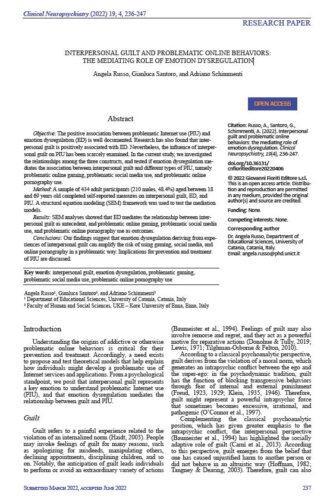Mental Health
Interpersonal Guilt and Problematic Online Behaviors: The Mediating Role of Emotion Dysregulation.
Open Access: Yes.
Abstract
Objective: The positive association between problematic Internet use (PIU) and emotion dysregulation (ED) is well documented. Research has also found that interpersonal guilt is positively associated with ED. Nevertheless, the influence of interpersonal guilt on PIU has been scarcely examined. In the current study, we investigated the relationships among the three constructs, and tested if emotion dysregulation mediates the association between interpersonal guilt and different types of PIU, namely problematic online gaming, problematic social media use, and problematic online pornography use.
Method: A sample of 434 adult participants (210 males, 48.4%) aged between 18 and 69 years old completed self-reported measures on interpersonal guilt, ED, and PIU. A structural equation modeling (SEM) framework was used to test the mediation models.
Results: SEM analyses showed that ED mediates the relationship between interpersonal guilt as antecedent, and problematic online gaming, problematic social media use, and problematic online pornography use as outcomes.
Conclusions: Our findings suggest that emotion dysregulation deriving from experiences of interpersonal guilt can amplify the risk of using gaming, social media, and online pornography in a problematic way. Implications for prevention and treatment of PIU are discussed.
Relevance
Interpersonal guilt “may arise from any attitude or behavior if the individual has the impression that he or she can cause pain to beloved others or can jeopardize the relationship with them.” It includes “survivor’s guilt (e.g., “I conceal or minimize my successes out of concern for making less successful people feel bad”), omnipotent guilt (including both separation/disloyalty guilt and omnipotent responsibility guilt; e.g., “I feel overly responsible for other people’s well-being”), and self-hate guilt (e.g., “I believe that if other people really know me, they would want nothing to do with me”).”
Both interpersonal guilt and emotional dysregulation were positively correlated with problematic online pornography use (and problematic online gaming and social media use). “The direct effect of interpersonal guilt on problematic online pornography use was significant.”
The problematic use of pornography “might constitute a maladaptive coping strategy to deal with negative emotions and dysregulated” emotional states as well as “distressing internal experiences.”
“This finding support previous research suggesting that high levels of emotion dysregulation increase the risk for problematic online behaviors” such as online pornography use as well as excessive use of videogames and social media.
“In fact, feelings of interpersonal guilt might increase emotion dysregulation, leading some individuals to seek a retreat into virtual realities…intense feelings of interpersonal guilt represents for some individuals the common psychological trigger that elicits emotion dysregulation and the subsequent dysfunctional behaviors in the Internet.”
Citation
Russo, A., Santoro, G., & Schimmenti, A. (2022). Interpersonal Guilt and Problematic Online Behaviors: The Mediating Role of Emotion Dysregulation. Clinical neuropsychiatry, 19(4), 236–247. https://doi.org/10.36131/cnfioritieditore20220406

